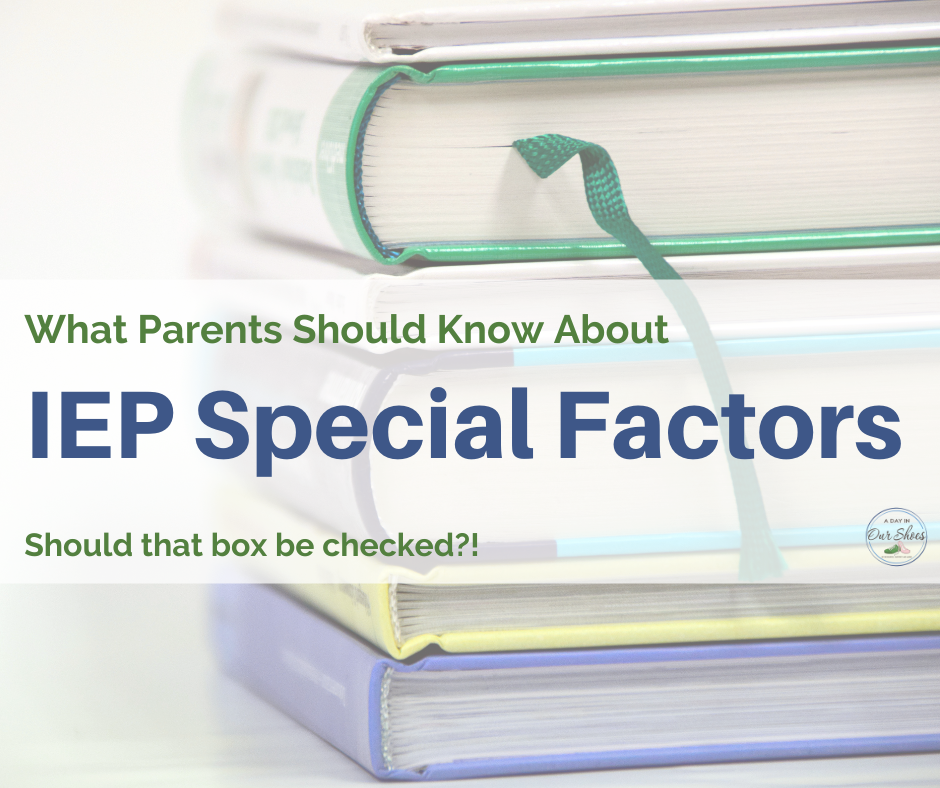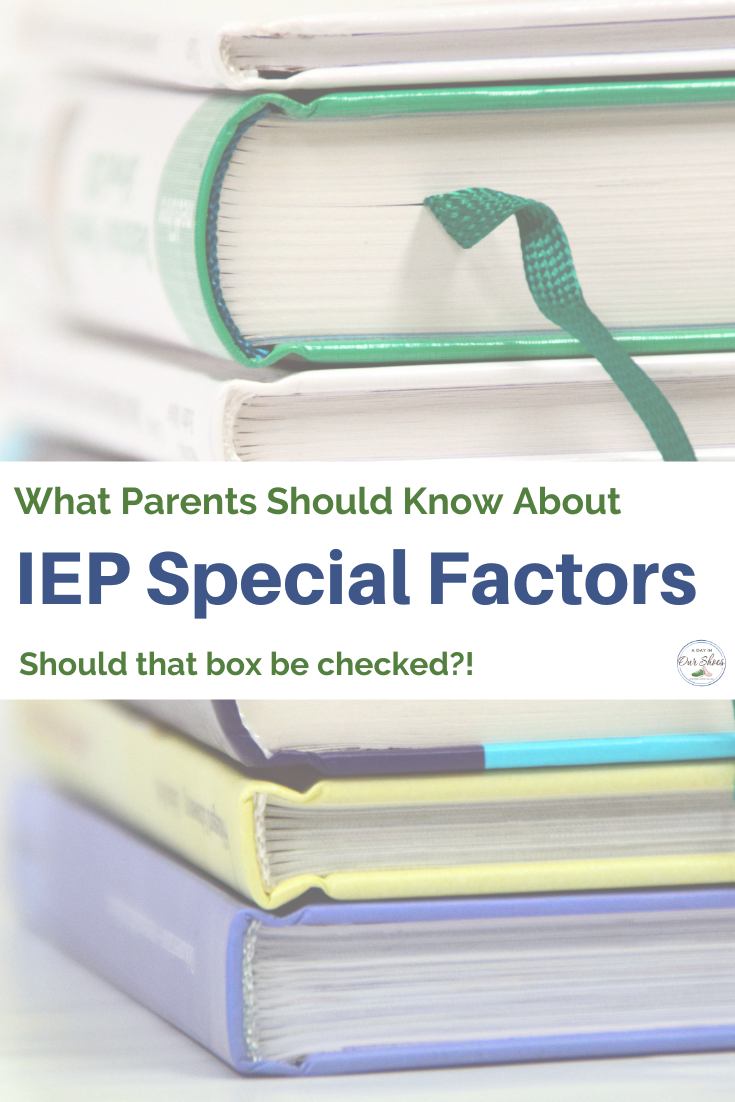What Are IEP Special Factors? And Yes, They Matter!
Most of the questions that I receive as a special education advocates are about the implementation of the IEP. Let’s face it. It is not an easy document to understand at times because of it’s length and format. But there are the special factors on an IEP that you should be considering when developing your student’s IEP. It’s one of the first few pages of most IEPs.

Special factors are specific areas that the IEP team must consider when developing a child’s IEP. These are non-negotiables under IDEA, and they can significantly impact how supports and services are delivered. The problem? Many parents don’t even realize these factors exist, let alone how to use them to their advantage.
What Are the IEP Special Factors?
The Individuals with Disabilities Education Act (IDEA) outlines five special factors that the IEP team must consider:
- Behavioral Concerns – If a child’s behavior impedes their learning (or that of others), the team must look into supports like Functional Behavior Assessments (FBAs) and Behavior Intervention Plans (BIPs).
- Limited English Proficiency – If a child is an English Learner (EL), the IEP team must ensure their language needs are being addressed alongside their disability needs.
- Blindness or Visual Impairments – IDEA requires the team to consider Braille instruction unless it’s determined unnecessary after an evaluation.
- Deafness or Hearing Impairments – The team must evaluate language and communication needs, including whether ASL or other supports are required.
- Assistive Technology Needs – If a child requires assistive technology (AT) to access their education, the team must consider what tools and training are necessary.
What IDEA Says about Special Factors on the IEP
IDEA’s regulations for considering these special factors appear at §300.324(a)(2)(i)-(v) and read as follows: (2) Consideration of special factors. The IEP Team must—
(i) In the case of a child whose behavior impedes the child’s learning or that of others, consider the use of positive behavioral interventions and supports, and other strategies, to address that behavior;
(ii) In the case of a child with limited English proficiency, consider the language needs of the child as those needs relate to the child’s IEP;
(iii) In the case of a child who is blind or visually impaired, provide for instruction in Braille and the use of Braille unless the IEP Team determines, after an evaluation of the child’s reading and writing skills, needs, and appropriate reading and writing media (including an evaluation of the child’s future needs for instruction in Braille or the use of Braille), that instruction in Braille or the use of Braille is not appropriate for the child;
(iv) Consider the communication needs of the child, and in the case of a child who is deaf or hard of hearing, consider the child’s language and communication needs, opportunities for direct communications with peers and professional personnel in the child’s language and communication mode, academic level, and full range of needs, including opportunities for direct instruction in the child’s language and communication mode; and
(v) Consider whether the child needs assistive technology devices and services. [§300.324(a)(2)]
The IEP team must determine if any of these factors are relevant for the child and, if so, address the factor in the child’s IEP.
Consideration of Special Factors on an IEP
If any of the above special factors are causing the student to have issues that “impede his/her ability to learn or others to learn in the educational setting” then special arrangements or accommodations must be made. Or in the case of assistive technology, would Assistive Technology (AT) give the student better access to their education and better facilitate learning?
Many of the special factors require additional testing to be requested from the parent. This can be discussed at the IEP table and then a permission to evaluate form should be issued with the proper evaluations requested. Once you have the evaluations completed, an evaluation review would take place (an FBA review would take place from a BCBA-Board Certified Behavioral Specialist for the behavior issues). Then recommendations should be made by the IEP team as to how to implement the strategies or accommodations to address the need.
As with much of the IEP process, it takes much follow-up and diligence on the parents’ part to ensure that the student is receiving proper services.
Common Errors I See in the IEP Special Factors Section
Here’s the thing—these special factors aren’t just bureaucratic checkboxes. They are rights built into the law to ensure that your child gets the appropriate services. But schools don’t always bring them up in meetings, leaving parents in the dark.
Take assistive technology, for example. If your child struggles with writing but hasn’t been evaluated for speech-to-text software, that’s a missed opportunity. If behavior challenges are brushed off as “a phase” instead of being addressed with an FBA, that’s a problem. The IEP process isn’t just about what the school offers—it’s about what they are required to consider.
As an advocate, I have run into quite a few situations with kids who had overlapping issues. Again, it takes diligence on the part of the parents to make sure that their child’s specific needs are being addressed.
Some examples of what I have run into:
- ELL/ESL students who were very fluent in English but kept in ELL classes, rather than addressing underlying reading disabilities (which were later uncovered).
- Students have behavior issues that were a result of a manifestation of their disability, but it was handled in punitive rather than restorative ways, and not addressed through an IEP or behavior plan.
- Schools reluctant to fully commit to checking off the AT box under “special factors” because they did not want to fully commit to the student or make the effort.
- The reverse of the above point-schools very quick to give a child an AT device rather than address the underlying need, such as working on handwriting.
- Overuse of behavior checkbox, and only addressing behaviors and behavior plans, rather than the underlying issue (such as being frustrated because they can’t learn and feel stupid) of the behaviors.
Like anything else with IEPs, it should be individualized and you have to pick your battles. I have seen kids get adequate and needed AT without having the boxes checked. So I don’t know if that is battle I would pick if my child had what they needed. Open communication with your team is key. Grappling with emotions is another.
I once had a mom, and myself, her team and her child all felt that the child had pretty much maxed-out on handwriting. That with her disabilities, the handwriting wasn’t going to improve. The team was actually pushing for AT, but mom was against it. So every situation is different.
My main concern is always that the IEP Present Levels section is complete and hopefully the rest falls into place.
If a child’s IEP Special Factors box isn’t checked when it should be….
If a child’s IEP Special Factors box isn’t checked when it should be, it can lead to serious consequences for their education and access to services. Here’s what can happen:
1. Missed Services and Supports
If a special factor—like assistive technology, behavior support, or communication needs—isn’t addressed, the school isn’t legally obligated to provide related services. This means a child might struggle unnecessarily without the tools or accommodations they need to learn.
Example: A nonverbal student who needs an AAC (augmentative and alternative communication) device doesn’t get one because “Assistive Technology” wasn’t checked. Now, they’re expected to function in class without a communication method.
2. Behavior Issues Could Be Mishandled
If the behavioral concerns box isn’t checked, the school doesn’t have to create a Behavior Intervention Plan (BIP) or conduct a Functional Behavior Assessment (FBA). Instead of getting the right supports, a child could be punished for behaviors that stem from their disability (like being suspended instead of getting a behavior plan).
Example: A child with autism struggles with transitions, leading to meltdowns. Instead of implementing strategies to help, the school keeps giving detentions—or worse, suspensions—because behavior support wasn’t considered.
3. Inaccurate or Incomplete IEP
A missing special factor means the IEP isn’t fully addressing all of the child’s educational needs. That could make it easier for the school to claim later that the child doesn’t need certain services, even if they clearly do.
Example: A child with vision impairment who should be receiving Braille instruction or large print materials doesn’t get them because the “Blind or Visually Impaired” box wasn’t checked. As a result, they struggle to keep up with reading assignments.
4. Denial of FAPE (Free Appropriate Public Education)
Under IDEA (Individuals with Disabilities Education Act), every child with a disability has the right to FAPE. If a special factor isn’t checked and services are denied, the school could be in violation of IDEA. In extreme cases, this can lead to:
- State complaints
- Due process hearings
- Compensatory services (where the school has to make up for lost time and services)
What You Can Do If a Box Wasn’t Checked (But Should Have Been)
✅ Bring it up at the next IEP meeting. Ask why it wasn’t checked and request documentation explaining their decision.
✅ Request an evaluation (in writing). If behavior, AT, or language needs weren’t considered, formally request an assessment.
✅ Know your rights. If your child was denied necessary services because of this mistake, you may have grounds for filing a complaint or requesting compensatory education.
The bottom line? Unchecked special factors = missing supports—and that can impact everything from behavior to academics. If something seems off, speak up and get it fixed!
What Parents Can Do
- Ask the question. At your next IEP meeting, bring up special factors. If the team hasn’t addressed them, ask why.
- Get it in writing. If the school claims a special factor doesn’t apply, request written documentation of their reasoning.
- Request assessments. If your child’s behavior, language needs, or assistive technology needs haven’t been fully evaluated, request assessments in writing. (And yes, there’s a template for that in my IEP Toolkit.)
At the end of the day, knowledge is power. If your school isn’t bringing up special factors, that doesn’t mean they don’t apply—it just means you might have to be the one to push for them. And that’s exactly why you’re here, right?
New to IEPs?
Here is more information for you, as you begin this IEP journey.
- What is an IEP? What is an IEP Plan? IEP Meaning, Explained.
- What Does a Multidisciplinary Team (MDT) Do in Special Education?
- 35 Frequently-Used Special Education Acronyms Every Parent Should Learn (PDF Chart)
- Free Special Education and IEP Terms and Terminology PDF
- IEP Timeline: Flowchart Explaining Special Education Process including Evaluations
- Your Big Picture Guide to the Entire IEP Process: A Step by Step Walkthrough
- How to get an IEP for your Child (Explained by a Parent IEP Advocate)
- What to Expect at Your IEP Meeting
- How to Understand IEP Evaluation Results and Prepare for an IEP Eligibility Meeting

